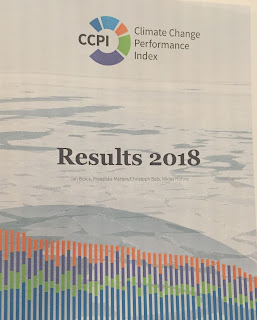Are the Climate Watch Dogs Barking up the Wrong Tree?
 Cindy Isenhour
Cindy IsenhourOn Wednesday Anna and I decided to pop into a press conference. The occasion was the release of the 2017 Climate Change Performance Index, a yearly ranking of national mitigation efforts.
Research in multiple disciplines suggests that rankings and referential data like this can serve as an important source of motivation for decision makers, particularly when they are outperformed by their benchmark or aspirational reference groups. It's important work and German Watch, the Climate Action Network and the New Climate Institute should be lauded.
In this year's report, there were no countries taking first, second or third place. This clever device was meant to draw attention to the fact that no country is currently on a Paris-compatible path. In fourth place was Sweden, a country that has long been celebrated as an international leader in climate mitigation (having reduced the carbon intensity of their economy by 72% since 1990). But, having conducted extensive research on Swedish climate policy, I was also realized that the report wasn't likely to contain the full story.
Back in 2008, while I was conducting dissertation fieldwork on climate policy in Sweden, the Environmental Protection Agency produced the world's first national emissions inventory based on consumption-based accounting principles. The approach included emissions associated with imports (regardless of where they were produced), and subtracted the emissions produced in country but bound for export markets. The report found that, even while Sweden had significantly reduced domestic emissions, consumer demand for imported products had increased by 40% over the previous decade, contributing to a net increase in emissions growth at the global level.
 It has always seemed to me that the territorial emissions accounting system established under the Kyoto Protocol presents a highly skewed picture of climate responsibility - given that neither trade nor emissions pay any attention to borders.
It has always seemed to me that the territorial emissions accounting system established under the Kyoto Protocol presents a highly skewed picture of climate responsibility - given that neither trade nor emissions pay any attention to borders.Another member of the audience, it seemed, agreed, asking a question about this issue in a Q&A after the press conference.
One of the authors of the report replied that it was extremely difficult to integrate consumption-based accounting due to difficulties with different international databases (a concern that has been thoroughly discounted by several of the world's most prominent ecological economists - see for example work by Glen Peters, Edgar Hertwich, Steven Davis and Ken Caldiera). He went on to explain that consumption-based emissions were not included because producer economies have made the choice to focus on export markets, profit from those decisions and should therefore be held responsible for mitigating the emissions. He said, "they made that choice."
I find this statement, and production-only models of emissions accounting, highly problematic. The structures of global capital have resulted in the relocation of carbon-intensive industries in the "global south", in countries often in desperate need of jobs and economic investment. Sure, we can say that developing countries made the choice to accept polluting industries (which is not always the whole story when abject poverty seems to pit economic development against environmental protection). But does this mean that we should absolve environmentally-progressive and affluent nations (and their citizens) of all responsibility for those emissions? They have also made a CHOICE to relocate dirty industries abroad where environmental and labor standards are lower, without reducing consumer demand for the products that will be produced there and sent back home.
So, I'll leave you with this. It is important not to forget, especially when reading mitigation rankings and observing negotiations, that despite the appearance of objectivity and neutrality, numbers are political and powerful tools. They can be manipulated in ways that allow the powerful to maintain their advantage.
...AND, they can also be manipulated to help environmentally progressive and affluent nations enhance their mitigation commitments by drawing attention to the need for demand-side mitigation measures. Since the release of their report in 2008 Sweden has implemented several programs designed to reduce the environmental impact of their citizen's consumption behaviors including low-carbon technological assistance for developing countries and more recently a tax incentive for citizens who CHOOSE to repair their goods, rather than replace them. With these programs, perhaps Sweden really is moving to the top of the list.



Comments
Post a Comment